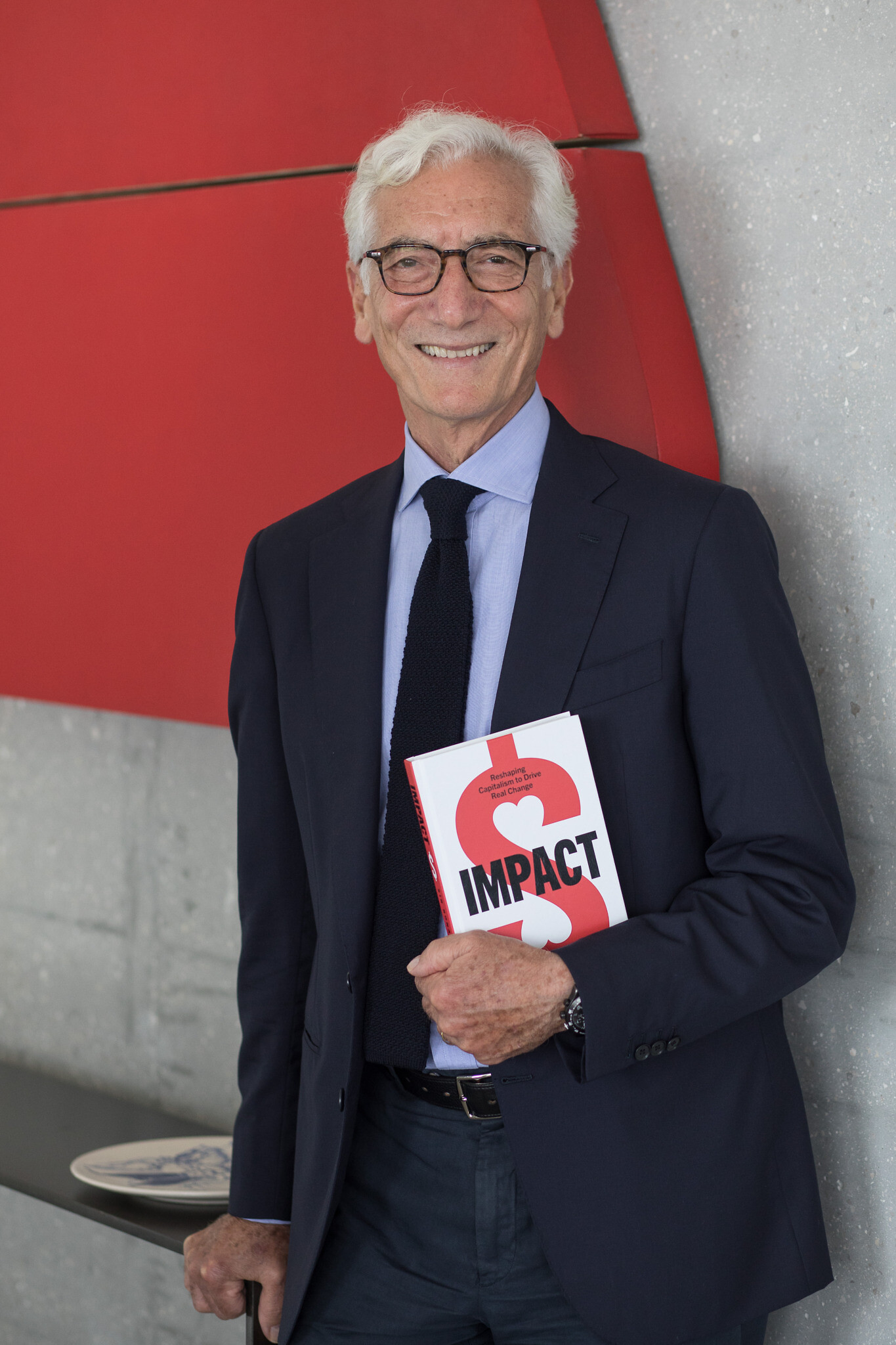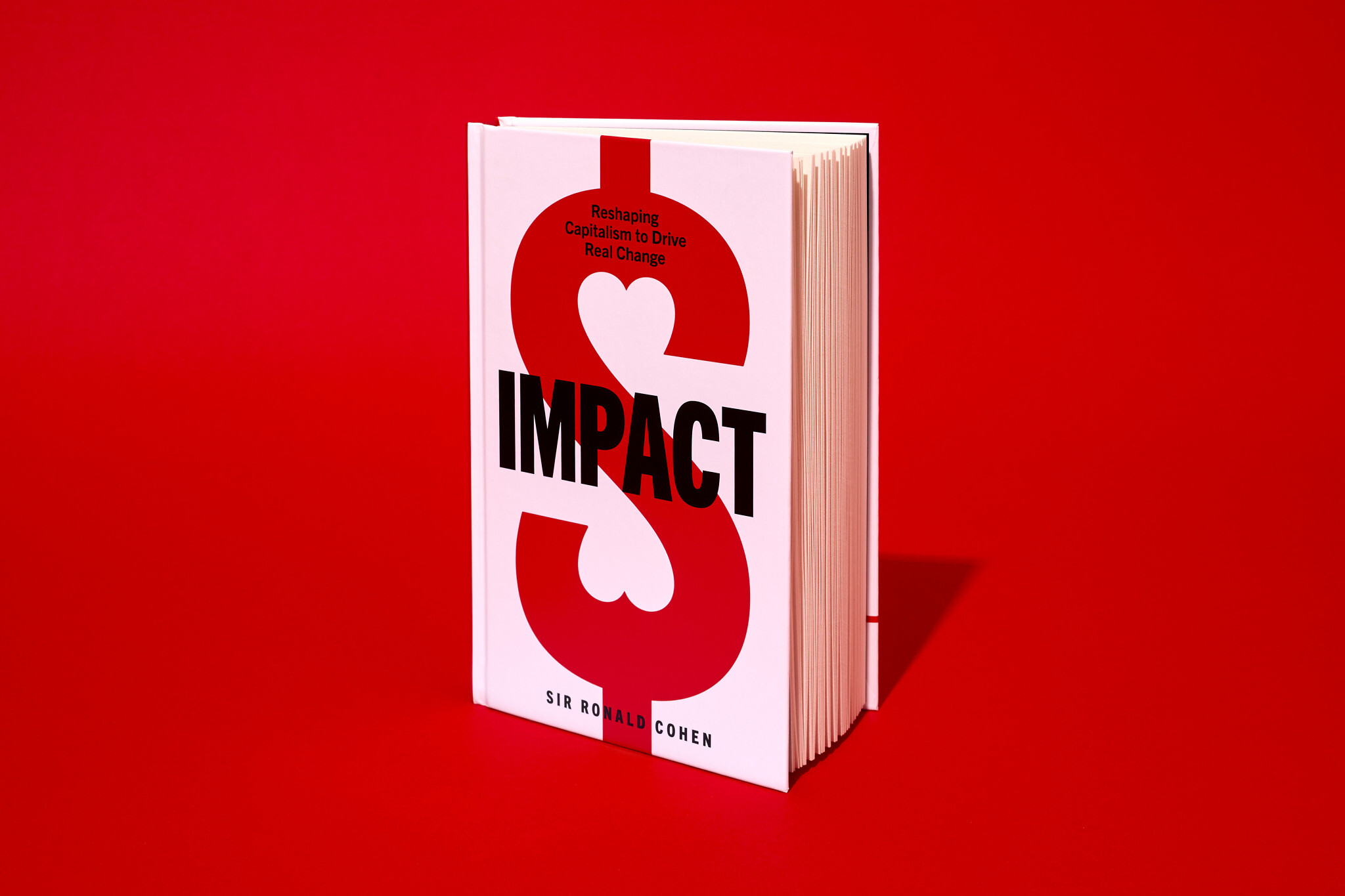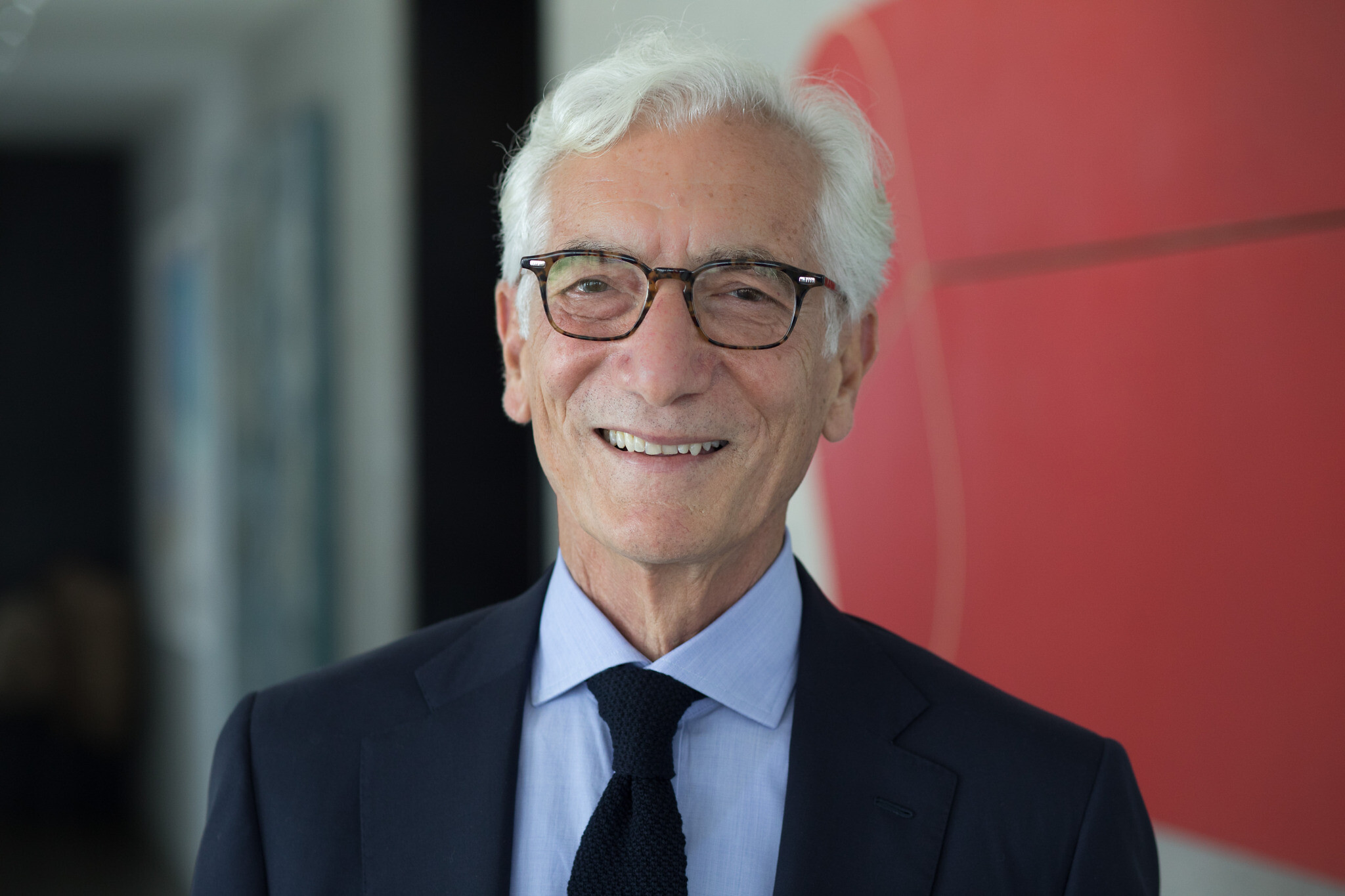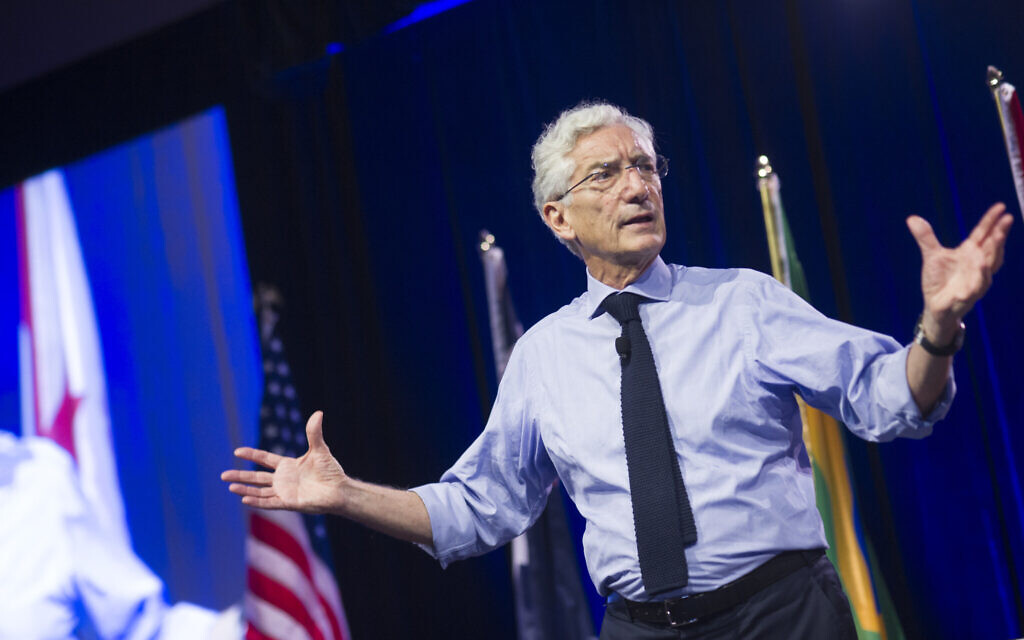Sir Ronald Cohen: ‘Our capitalism is no longer fit for purpose’
Investor and philanthropist's new book warns governments and big business that bringing ‘impact’ to our choices is the only way to stop rising inequality
One of the first things you notice about Sir Ronald Cohen’s book on changing the way money works for us is that Bono calls him ‘Ronnie’. Sure enough, as you speak to others about him, you realise that everyone does. Cue our Zoom interview and he starts by asking me to call him ‘Ronnie.’ As a big and deferential fan, I say, it’s ‘Sir Ronnie’ as a minimum.
It should probably just be ‘Sir’. This knight is one of the most respected voices in world finance (and one of the most difficult to interview – I’ve been trying for eight years). The U2 star is but one of the glitterati penning epithets on the sleeve of Impact: Reshaping capitalism to drive real change. Others tipping their quills to the investor and philanthropist include the managing director of the IMF, a former chief executive of the World Bank and a Nobel prize winner in economics. He’s the Jew you’ve never heard of but should get to know.
Who is he? Almost 50 years ago, aged 26, he co-founded Apax Partners, a venture capital and private equity firm which today manages more than £50 billion.
Get The Jewish News Daily Edition by email and never miss our top stories Free Sign Up
In 1994, he made Apax the first British investment house to set up shop in Israel, 20 years later he helped set up Israel’s first social investment bank, and it is from Israel that he dials in now.
Aged 60, he stepped down from the top job “to tackle social issues and try to help resolve the conflict in the Middle East”.
The Portland Trust, which he chairs, helped to build the Palestinian industrial city of Rawabi to boost entrepreneurship and opportunity in the West Bank. It had mixed success, in part because the Israelis didn’t turn the taps on, but in terms of impact investing he’s lit the skies, co-founding the UK’s first social investment bank (Big Society Capital) with money from dormant bank accounts.
His aim these days is more modest: to remake capitalism. He has long warned of a “wall of fire” between rich and poor if inequality continues, and in his new book he sees the outcome in violent protests in France, Lebanon and Chile. In the UK, too, he hears sirens – Brexit, refugees, frustration, nationalism, the strain on public infrastructure – while everywhere we degrade the planet.

“Capitalism has served us very well for 250 years, but we’re at the stage where the consequences of the capitalist system are so great that governments can’t cope with them,” he says. “They’re looking at social and environmental issues without having the tools or resources to bring credible responses to them.”
His book is about “how things can’t go on as they are,” he says. “We’re digging a deeper and deeper hole for ourselves. Companies cause huge damage, governments then have to tax us all to remedy it, but the scale of the damage means that governments don’t have enough resources to do that.
So, we must bring ‘impact’ to our choices. We must buy products from companies whose values we share, work for companies whose values we share, invest in companies seeking to do good and minimise harm.
“To do that effectively, we must measure companies’ impact. If we measure the effects they have on people and the environment through their products, employment and operations, then effectively we bring ‘impact’ to the centre of our economic system. That’s when investment drives solutions to improve the world.”
To get people thinking about impact, he’s asking questions. To the wealthy: do you just want to make money, or do you want your money to make an impact? To businesses: do you just want to drive sales, or do you also want to do good? To the rest of us: do you just want to buy based on price and convenience, and work for the best payers, or do you want to buy from and work for firms based on how they impact society and the environment?
Because computing power and big data means that firms’ negative impacts can now be measured, costed and published, and for a new generation of consumers, workers and investors, this information matters.
His latest victory is this very information – the dull-sounding, world-changing field of ‘impact-weighted accounts’. Impact investing is driving private capital to serve social and environmental good. It’s when decisions are based not just on risk and reward, but on ‘impact’ too. How? By “linking improvements in environmental and social outcomes to a financial return”. Hence ‘impact-weighted accounts’.

The idea of linking social or environmental outcomes to financial return can manifest in something called a Social Impact Bond (SIB), first trialled in Peterborough in 2010, when the financial return on a security was linked to a reduction in reoffending of young male inmates in Peterborough jail.
It worked. Reoffending fell by ten percent over five years, and investors made three percent. Scale it up and you understand Tesla founder Elon Musk, who “wants to make a tonne of money but also change the world for the better”.
Sir Ronnie’s ideas are laced not only with idealism but also layered with realism. Indeed, as he says, this is no longer pie in the sky: witness all the institutional investors emerging with “an impact lens” in the past three years.
The reason they queue up to listen to this softly spoken sage is because he knows what he’s on about. First asked to advise the British government on poverty 20 years ago, he chairs both Apax Foundation (through which Apax gives millions to good causes) and the Global Steering Group for Impact Investment at Harvard Business School. He is also an author (his first book, in 2007, was The Second Bounce of the Ball) and co-founder of the UK’s first social investment bank.
His new book brims and bubbles with the language of revolution and the urgency of a man who never wanted his crowning achievement to be a 30 percent annual return on investment. We are all of us forged through our experiences, and Sir Ronnie is no different, having fled Egypt aged 11 for refuge in the UK. “We arrived with just one suitcase each, me clutching my stamp collection under my arm, fearing that it would be taken away from me.”
It set him on a path to Oxford, Harvard, the City of London and, in 2001, to a knighthood, philanthropy and a retirement advising prime ministers including Tony Blair and David Cameron. Years earlier, it started with a fellowship: “It paid for my first year at Harvard,” he recalls, “but required me to bring something of value back to the UK. I ended up bringing back venture capital.”
“We arrived with just one suitcase each, me clutching my stamp collection under my arm, fearing that it would be taken away from me.”
He thrived in it, but ‘it’ was contributing to inequity, which is now unsustainable. As a proportion of its wealth, the rich world spends on health and education twice what it did 60 years ago – “and it still isn’t enough”. Philanthropy chips in but can only do so much, he says. A new system is needed.
To an extent, it is here. An incredible $30 trillion is already tied up in environmental, social and governance (ESG) investing around the globe, that is in companies seeking to achieve more than just profit. That is one third of the world’s professionally managed assets. Likewise, there is now nearly $1 trillion of impact investment, where the impact is actually measured.
The breakthrough moment came last year when Harvard published its ‘impact-weighted accounts’ after crunching four decades’ worth of data on the environmental impact of 1,800 firms and costing it (employment and product impacts to follow next year). You can now compare, for instance, two global chemical companies with similar sales. The annual environmental damage from one is £13 billion, the other £3 billion. If you are an investor, or a potential business partner, or an end user, and you know this, which firm do you choose?
Impact investing incentivises social and environmental integrity over self-interest; and in the UK, where we have social investment tax relief, it also pays. The idea is spreading: Barclays now has impact investment products for small investors, while foundations such as the Guys and St Thomas’ Charity are moving endowments into impact investing. Last year, Rethink Impact Fund launched with £250 million to “invest in female leaders using tech to tackle global challenges”.
State and private-sector interests need not collide, Sir Ronnie says. He wants governments to mandate that all companies publish ‘impact-weighted accounts’ in two or three years’ time “so that we can look at the impact performance of a company alongside its profit performance”. In Israel, the pension regulator has already told pension fund managers to account for impact.
“If governments mandate that companies must publish their impact, you turn that $30 trillion into a powerful engine for change. The result? Less damage to the environment, fewer social issues such as child labour, underpayment, poor working conditions, and more money to retrain and reskill people.”
He’s not there yet. Questions remain as to how precisely to measure impact, but Sir Ronnie is unfazed. He draws a comparison with the effect of the Wall Street crash of 1929, which led the US government to require all companies to prepare accounts according to accepted practices and have them independently verified.
If governments mandate that companies must publish their impact, you turn that $30 trillion into a powerful engine for change. The result? Less damage to the environment, fewer social issues such as child labour, underpayment, poor working conditions, and more money to retrain and reskill people
“At the time, many said it would spell the end of American capitalism. In fact, it led to huge growth in investment markets, because investors and companies felt they could rely on the accounting system.”
The effects will ripple down from stock exchanges to shopping aisles. “You’ll pick up a box of cornflakes and define each ingredient by its environmental and nutritional impact,” he says. “You’ll measure individual product lines’ impact using phones and barcodes. You’ll be able to see the impact of what you’ve bought. That’s just one implication.”
His job appears to be steering capital towards impact, but isn’t it difficult asking those who made money in one system to seek another? “Some think making as much money as possible is the purpose of life, regardless of the consequences,” he says. “My book won’t persuade them otherwise. But most people who made a lot of money in recent decades came from nothing, and their origins are not far, psychologically, from their consciences.”
From where will the urge to change come? “The young today feel overwhelmed. It’s much more difficult to get the jobs, to buy a house, to make ends meet, so they are much more receptive to changing the system. Jobs are changing, professions are going through transformative change, and whole industries are declining, so for a lot of young people ‘impact’ is a way out of this mess, a way forward. That’s why I believe the impact revolution is going to be led by young people, just as the tech revolution was.”

He mentions tikkun olam throughout, so I finish by asking why ‘impact investing’ should be of interest to his fellow Jews. “Most of us were brought up in homes with thinking that life is not just about ourselves,” he says. “Impact is a way of being for yourself, being for others, and doing it now… Making profit improves the world around us, we’re investing in improving lives and the planet. ‘If not now, when?’ The time is now. We cannot meet the huge challenges we face without changing our system.”
To understand the future of money, what it does and how it will drive change, we need not look far. UJIA chief executive Mandie Winston told a webinar audience recently that Sir Ronnie’s book was “crucial and visionary”.
“When you hear about Sir Ronald’s work and the way he is transforming philanthropy and our society, one cannot help but feel proud, inspired, and moved to action.” I couldn’t agree more.

Thank you for helping to make Jewish News the leading source of news and opinion for the UK Jewish community. Today we're asking for your invaluable help to continue putting our community first in everything we do.
For as little as £5 a month you can help sustain the vital work we do in celebrating and standing up for Jewish life in Britain.
Jewish News holds our community together and keeps us connected. Like a synagogue, it’s where people turn to feel part of something bigger. It also proudly shows the rest of Britain the vibrancy and rich culture of modern Jewish life.
You can make a quick and easy one-off or monthly contribution of £5, £10, £20 or any other sum you’re comfortable with.
100% of your donation will help us continue celebrating our community, in all its dynamic diversity...
Engaging
Being a community platform means so much more than producing a newspaper and website. One of our proudest roles is media partnering with our invaluable charities to amplify the outstanding work they do to help us all.
Celebrating
There’s no shortage of oys in the world but Jewish News takes every opportunity to celebrate the joys too, through projects like Night of Heroes, 40 Under 40 and other compelling countdowns that make the community kvell with pride.
Pioneering
In the first collaboration between media outlets from different faiths, Jewish News worked with British Muslim TV and Church Times to produce a list of young activists leading the way on interfaith understanding.
Campaigning
Royal Mail issued a stamp honouring Holocaust hero Sir Nicholas Winton after a Jewish News campaign attracted more than 100,000 backers. Jewish Newsalso produces special editions of the paper highlighting pressing issues including mental health and Holocaust remembrance.
Easy access
In an age when news is readily accessible, Jewish News provides high-quality content free online and offline, removing any financial barriers to connecting people.
Voice of our community to wider society
The Jewish News team regularly appears on TV, radio and on the pages of the national press to comment on stories about the Jewish community. Easy access to the paper on the streets of London also means Jewish News provides an invaluable window into the community for the country at large.
We hope you agree all this is worth preserving.
-
By Laurent Vaughan - Senior Associate (Bishop & Sewell Solicitors)
-
By Laurent Vaughan - Senior Associate (Bishop & Sewell Solicitors)
-
By Laurent Vaughan - Senior Associate (Bishop & Sewell Solicitors)
-
By Laurent Vaughan - Senior Associate (Bishop & Sewell Solicitors)






















